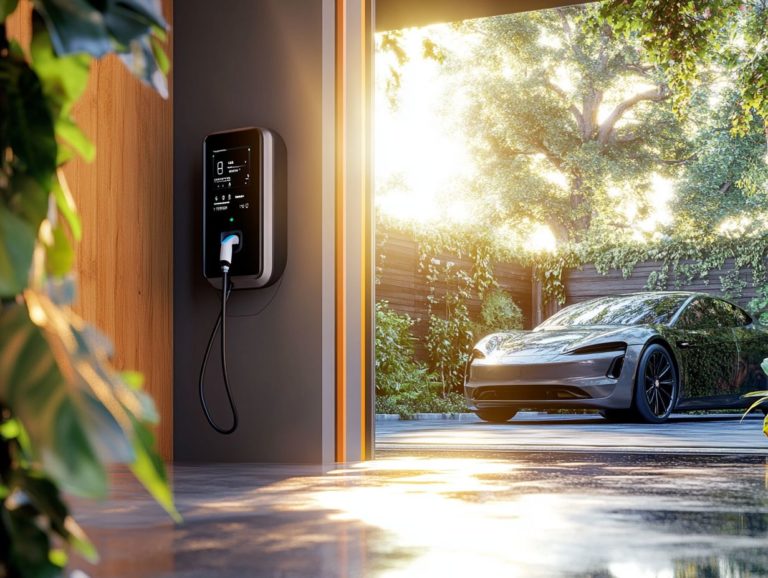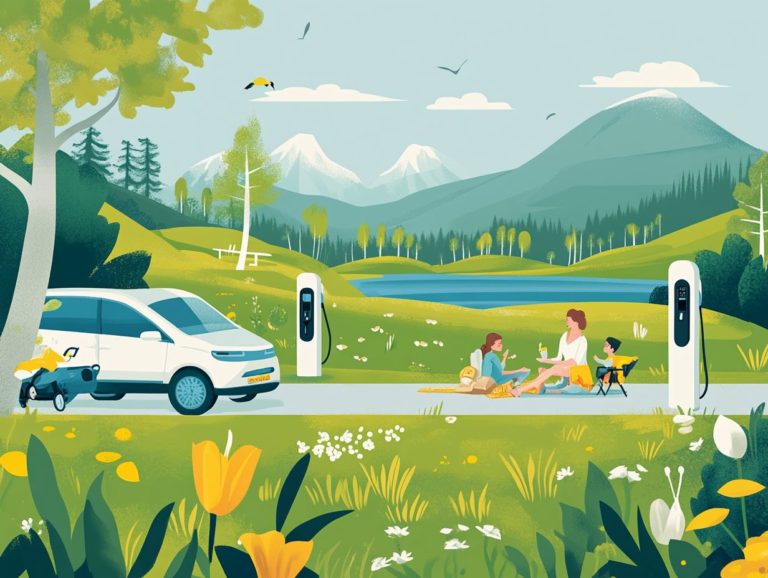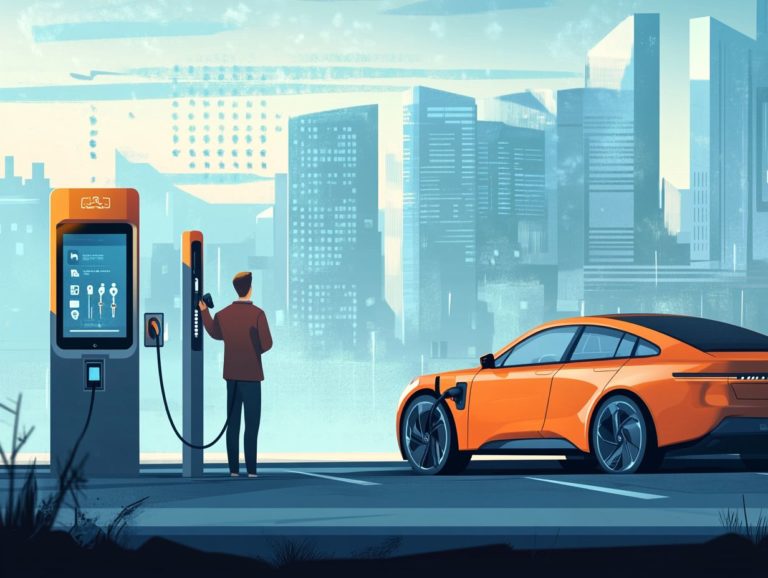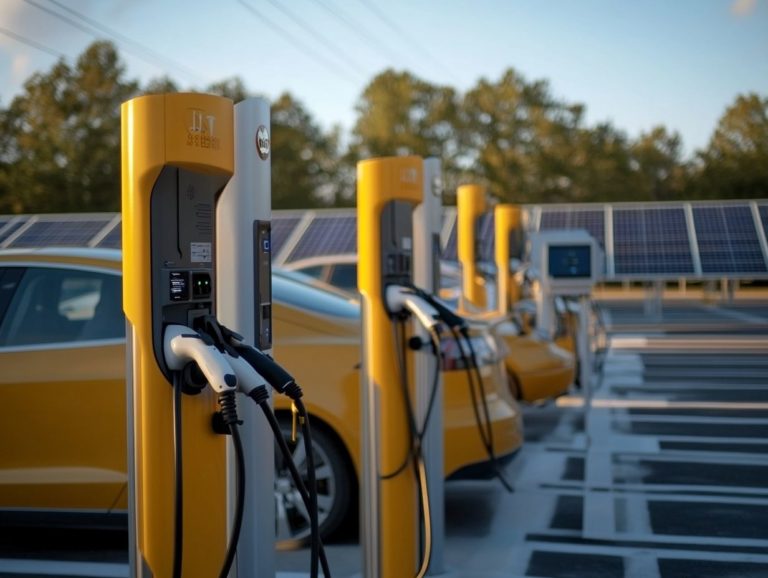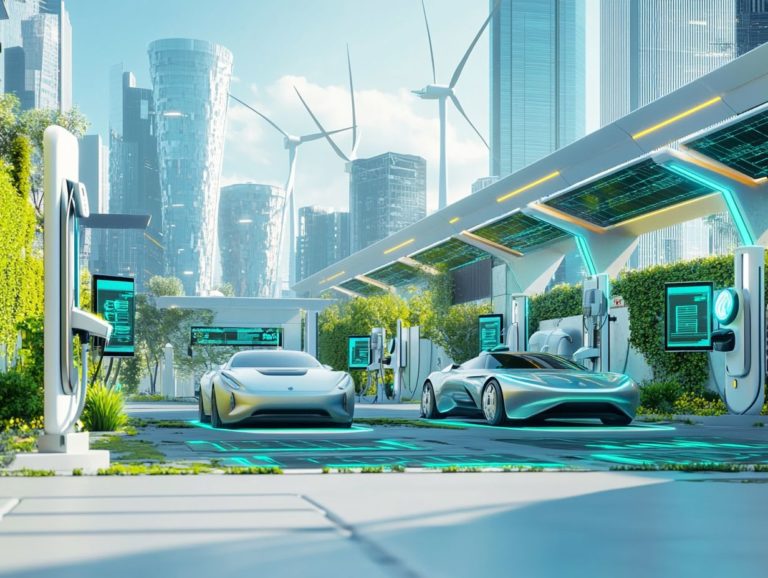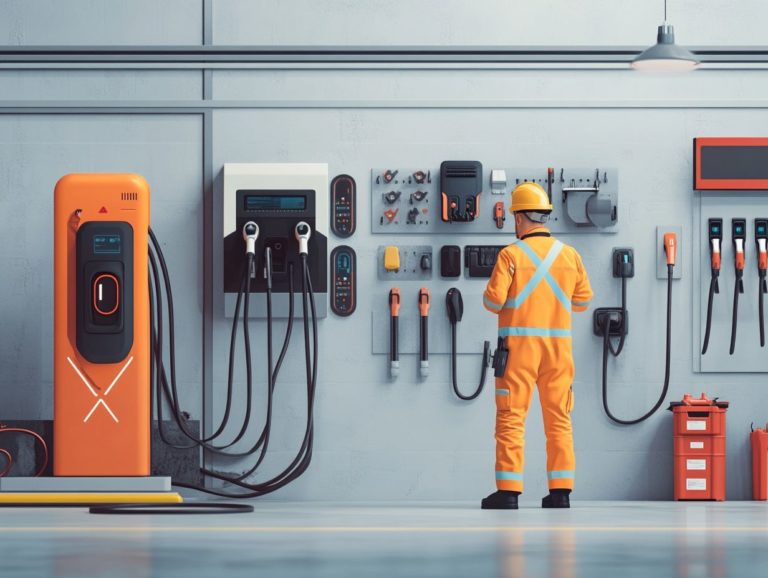the future of ultra-fast ev charging
As the electric vehicle (EV) market increases, the demand for ultra-fast charging solutions is becoming increasingly critical. With a growing number of drivers embracing electric vehicles, the limitations of current charging technologies can hinder convenience and slow down adoption rates.
This article delves into the rising demand for ultra-fast EV charging and the challenges it encounters. Innovations are paving the way for its future. You ll discover how reduced charging times and the necessary infrastructure can significantly enhance the EV experience, transforming the way you think about electric mobility.
Contents
- Key Takeaways:
- The Need for Ultra-Fast EV Charging
- Current State of EV Charging Technology
- Potential Benefits of Ultra-Fast EV Charging
- Innovations in Ultra-Fast EV Charging
- Barriers to Implementing Ultra-Fast EV Charging
- The Future of Ultra-Fast EV Charging
- Frequently Asked Questions
- What is the future of ultra-fast EV charging?
- How fast can we expect EV charging to become?
- Will ultra-fast EV charging be widely available?
- What are the benefits of ultra-fast EV charging?
- What are the challenges facing the future of ultra-fast EV charging?
- How will ultra-fast EV charging impact the environment?
Key Takeaways:
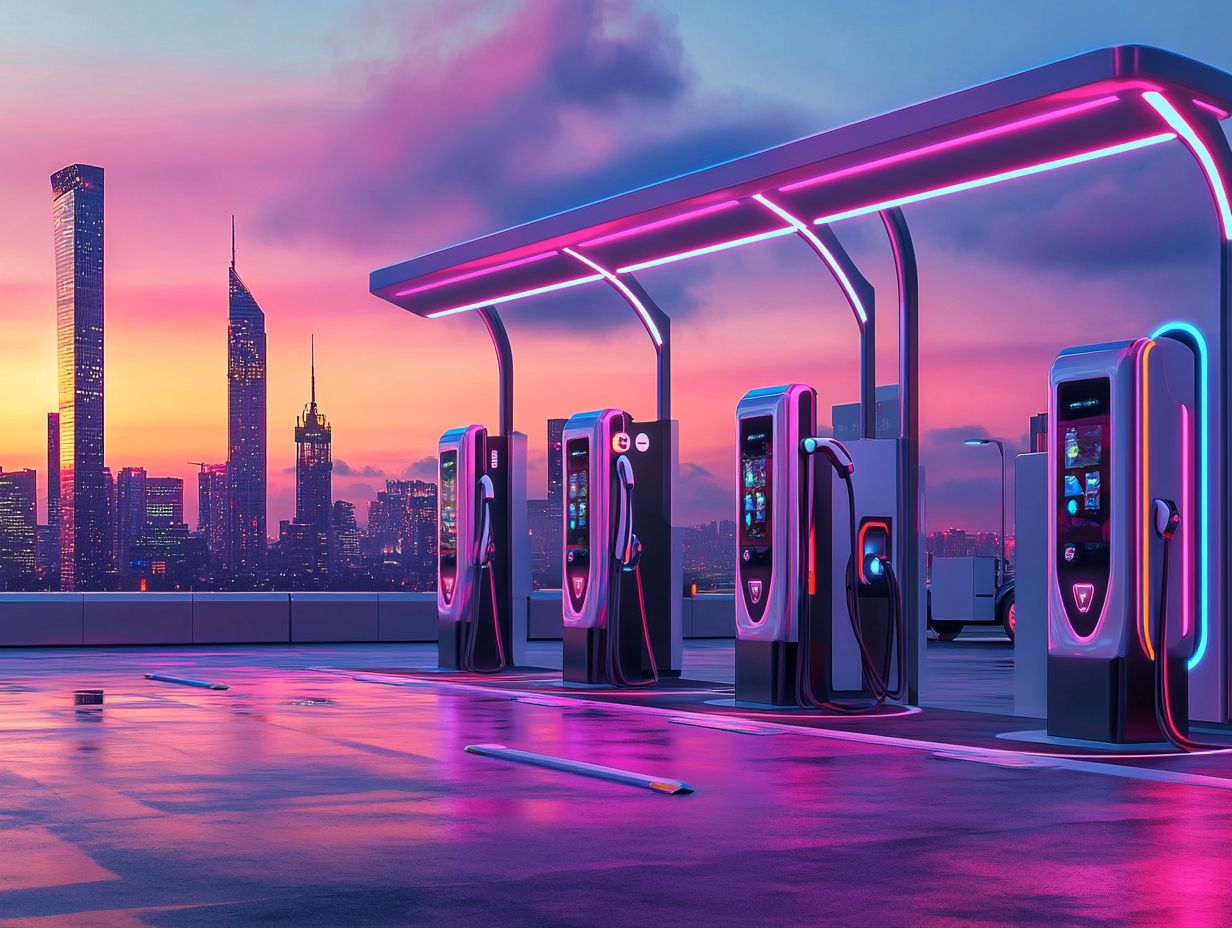
Ultra-fast EV charging is crucial for the growing demand for electric vehicles, reducing charging time and increasing convenience. New technologies and the latest innovations in EV charging hardware are constantly being developed to improve the speed and efficiency of EV charging. Despite cost and infrastructure challenges, the future of ultra-fast EV charging looks promising, with the potential to greatly impact EV adoption and infrastructure.
The Need for Ultra-Fast EV Charging
The rapid rise of electric vehicles (EVs) on the roads creates an urgent demand for ultra-fast EV charging solutions. This increase meets consumer needs and alleviates the fear of running out of battery power while driving. It is essential to adapt to the evolving landscape of charging infrastructure.
Industry giants like BP, Shell, and Chevron are making significant investments in renewable energy to support this transition. Innovations like battery swap stations, where drivers can quickly exchange their depleted battery for a fully charged one, and smart charging technologies present exciting opportunities to enhance user convenience and satisfaction.
Growing Demand for Electric Vehicles
The electric vehicle market is growing as more consumers choose eco-friendly options over traditional fossil-fuel-powered vehicles. This surge is driven by supportive government incentives that encourage the adoption of electric vehicles and rapid advancements in EV technology, enhancing performance while driving down costs.
As investment capital flows into the industry, it paves the way for infrastructure expansion, making charging stations more accessible and convenient for you. With more individuals embracing eco-friendly options, consumer preferences are decisively shifting toward sustainability. This signifies a transformational change in transportation that addresses climate concerns and stimulates economic development across various sectors.
Current State of EV Charging Technology
As you navigate the rapidly evolving landscape of electric vehicles, you’ll find that the current state of EV charging technology offers a remarkable variety of options. From fast charging to ultra-fast chargers, these technologies are crucial for catering to the needs of today s discerning electric vehicle users.
Limitations and Challenges
Despite remarkable advancements in electric vehicle charging technologies, significant limitations and challenges persist. These issues primarily revolve around the scalability of charging infrastructure, power consumption, and the environmental impact of production.
The complexities tied to utility locating can pose considerable hurdles, often resulting in project delays and unexpected costs. Effective project management is essential in navigating the myriad stakeholders involved from municipal authorities to private companies while also tackling regulatory frameworks that can be quite convoluted.
Environmental concerns, particularly regarding land use and the ecological footprint of installation sites, add another layer of complexity to these initiatives. This necessitates innovative solutions that harmonize growth with sustainability.
As communities strive to expand EV charging networks, addressing these multifaceted challenges is crucial for establishing a resilient and efficient infrastructure that can meet future demands.
Potential Benefits of Ultra-Fast EV Charging
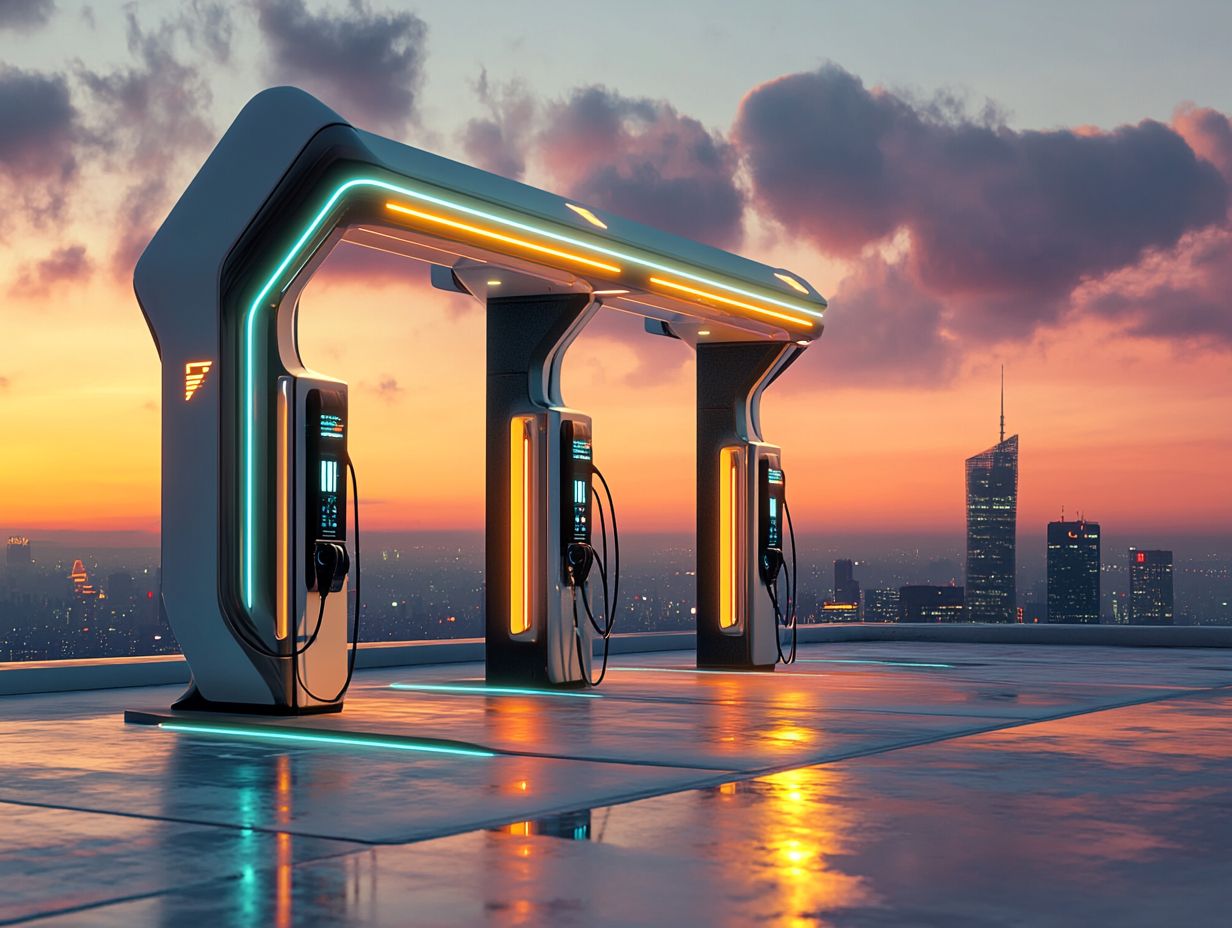
Ultra-fast EV charging offers a multitude of advantages for you, such as significantly reduced charging times and heightened convenience. These factors are essential for helping to build better charging stations and improving energy management within the electric vehicle ecosystem.
By embracing these advancements, you position yourself at the forefront of the evolving landscape of sustainable transportation.
Reduced Charging Time and Increased Convenience
The implementation of ultra-fast chargers transforms your charging experience by dramatically reducing waiting times. This allows you to seamlessly integrate electric vehicles into your daily routine with unmatched convenience.
Exciting advancements in charging technology let you recharge your vehicle in record time! You can effortlessly fit charging sessions into your busy schedule.
These fast charging solutions cater not only to your immediate needs but also enhance your overall satisfaction by minimizing downtime. With a variety of charging networks and options at your disposal, you can enjoy peace of mind knowing that power is readily available whenever you need it.
Ultimately, these innovations in charging infrastructure are vital for boosting electric vehicle adoption. They enable you to reap the benefits without the typical inconveniences associated with traditional charging methods.
Impact on EV Adoption and Infrastructure
The integration of ultra-fast charging technology plays a pivotal role in boosting EV adoption rates. When you combine a robust charging network with rapid charging options, owning an electric vehicle becomes far more appealing to a broader audience.
This enhanced infrastructure effectively tackles key concerns like range anxiety, which is the fear of running out of battery before you can recharge, and charging time. These issues have historically deterred potential buyers from making the switch to electric models.
As ultra-fast charging stations become more widespread, they cultivate a supportive ecosystem for EV users. This allows you to recharge your vehicle quickly whether on long road trips or during daily commutes.
This extensive network bolsters consumer confidence, reassuring both new and seasoned EV owners that convenient access to charging facilities will always be within reach. As a result, it further encourages the transition toward a diverse array of electric vehicle options tailored to suit various lifestyles and needs.
Innovations in Ultra-Fast EV Charging
Innovations in ultra-fast EV charging are rapidly transforming the landscape. Cutting-edge technologies and advanced charging methods are emerging to elevate energy empowerment and enhance energy storage capabilities for electric vehicles.
You can expect these developments to significantly improve your experience. They make electric driving not only practical but also remarkably efficient.
New Technologies and Charging Methods
New technologies in charging methods, particularly smart charging solutions, are emerging to optimize energy distribution and improve the efficiency of the electric vehicle charging process.
These innovative systems utilize real-time data to evaluate both energy demand and supply, enabling dynamic adjustments in charging rates. By integrating advanced algorithms and machine learning, smart charging technologies foster a seamless interaction between electric vehicles and the grid.
Vehicle-to-grid (V2G) technologies allow EV owners to send energy back to the grid, further promoting sustainability and resilience in energy networks. As these solutions continue to advance, they promise to revolutionize the landscape of energy distribution, making it more user-friendly and efficient for everyone involved.
Barriers to Implementing Ultra-Fast EV Charging
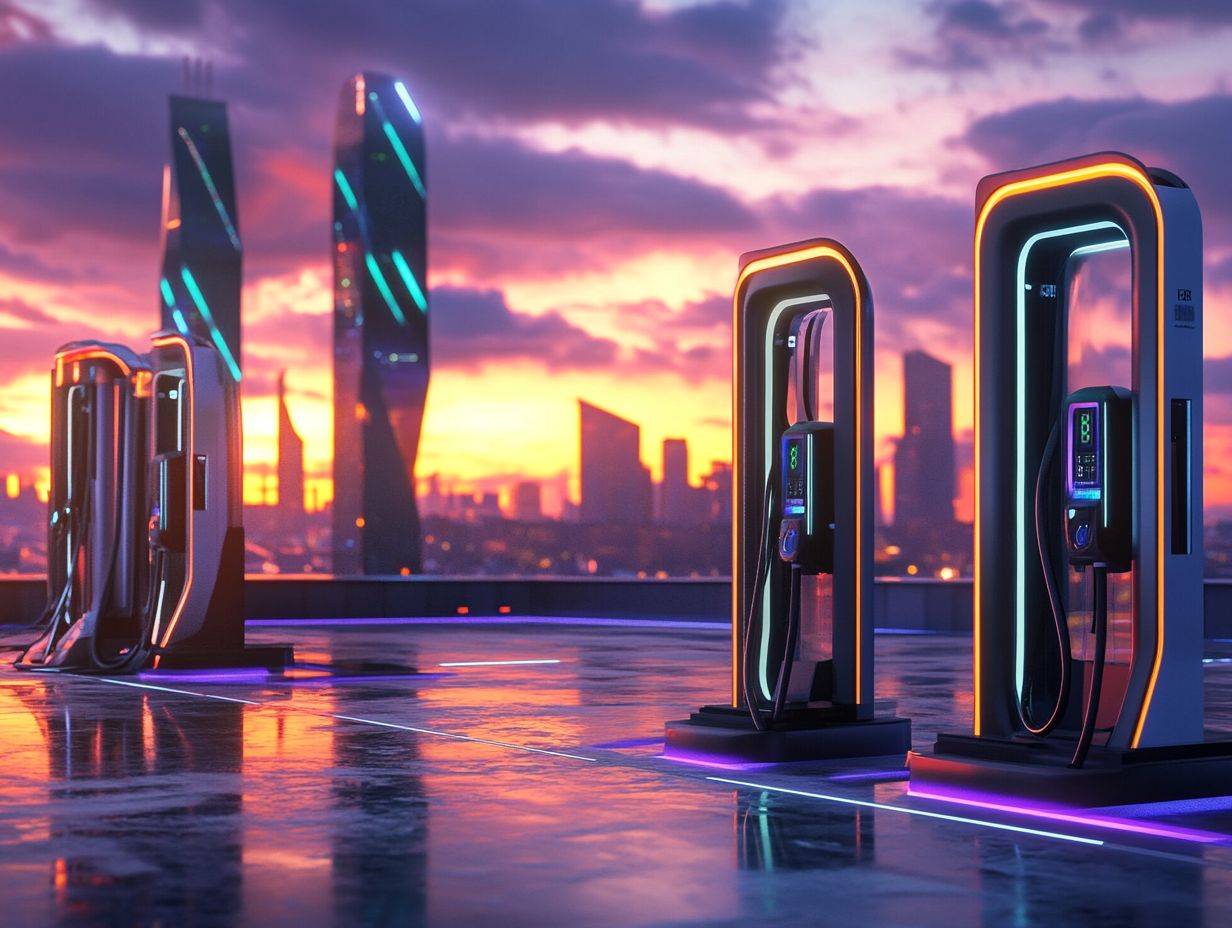
Implementing ultra-fast EV charging systems presents a range of formidable barriers, including high costs and significant infrastructure challenges. Acting now to overcome these challenges is critical, as substantial investment capital is required to make ultra-fast charging a reality!
Cost and Infrastructure Challenges
The cost of deploying ultra-fast EV charging stations, along with the necessary infrastructure, presents significant challenges that demand strategic project management and accurate mapping of utility lines.
As you navigate the transition toward sustainable transportation solutions, you ll need to confront the financial implications tied to the extensive installation of these charging units. This endeavor involves purchasing and installing the charging technology, integrating essential electrical upgrades, and negotiating permits with local governments.
Meticulous planning is crucial to accurately map existing utility lines, helping you avoid costly disruptions during installation. This highlights the importance of detailed assessments and expert guidance.
By overcoming these hurdles, you ll contribute to a more robust electric vehicle ecosystem that fosters widespread adoption.
The Future of Ultra-Fast EV Charging
Get ready for a bright future ahead! Ultra-fast EV charging is transforming how we drive, brimming with predictions and possibilities that can lead to a sustainable, fossil-fuel-free environment.
This evolution is driven by significant advancements in energy management and the expansion of charging networks, paving the way for a greener tomorrow.
Predictions and Possibilities
Predictions for the future of ultra-fast EV charging suggest a variety of charging options tailored to your evolving needs, highlighting the growing demand for fast charging options and facilitating an increase in EV adoption across diverse markets.
As innovative technologies, like wireless charging and battery swap stations, come into play, you ll likely discover greater convenience and accessibility for fueling your electric vehicle.
The integration of smart grid technology will optimize energy consumption, transforming individual EVs into mini power hubs through vehicle-to-grid capabilities.
These advancements support a sustainable future and alleviate range anxiety, making electric vehicles an even more attractive option for you as a driver.
Partnerships between automakers and charging infrastructure providers will enhance the availability of charging stations, ensuring you have more options and significantly reducing wait times.
Frequently Asked Questions
What is the future of ultra-fast EV charging?

The future of ultra-fast EV charging is bright. With advancements in technology and infrastructure, EVs can now be charged in a matter of minutes, and by 2030, you can expect even more from EV charging solutions, making long-distance travel more feasible and convenient.
How fast can we expect EV charging to become?
Experts predict that ultra-fast EV charging will continue to improve, with speeds reaching up to 350 kW. This means that EVs can be charged in as little as 15 minutes, significantly reducing charging times.
Will ultra-fast EV charging be widely available?
As more car manufacturers invest in EVs and countries set goals for reducing carbon emissions, the demand for ultra-fast EV charging will continue to grow. This will likely lead to widespread availability in the near future.
What are the benefits of ultra-fast EV charging?
Ultra-fast EV charging reduces charging times and allows for longer-distance travel without frequent stops. It also helps reduce carbon emissions, making EVs a more viable option for consumers.
What are the challenges facing the future of ultra-fast EV charging?
One of the main challenges is the need for infrastructure development. To achieve widespread availability, there must be a significant increase in the number of charging stations and the speed at which they can charge EVs.
How will ultra-fast EV charging impact the environment?
Ultra-fast EV charging has the potential to greatly reduce carbon emissions, encouraging more people to switch to EVs and making the charging process more convenient. This can help mitigate the effects of climate change and promote a cleaner, more sustainable future.
Want to learn more about EVs? Stay tuned for the latest updates!

